Majoritatea grupurilor politice nu sunt hotărâte să susțină moțiunea de cenzură care ar răsturna Comisia condusă de von der Leyen. Dar ea nu a fost scutită de critici.
Sursa: EuroNews
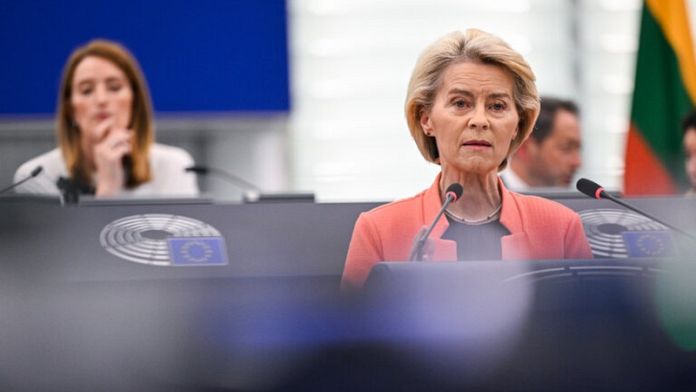
Majoritatea grupurilor politice nu sunt hotărâte să susțină moțiunea de cenzură care ar răsturna Comisia condusă de von der Leyen. Dar ea nu a fost scutită de critici.
Sursa: EuroNews
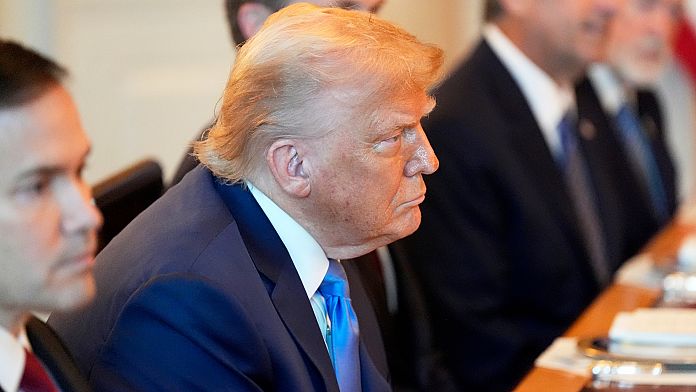
President Donald Trump meets with Israel's Prime Minister Benjamin Netanyahu in the Blue Room of the White House. 7 July 2025. – Copyright AP/Alex Brandon Copyright AP/Alex Brandon By AP with Eleanor Butler
President Donald Trump on Monday announced a 25% tax on goods imported from Japan and South Korea, as well as new tariff rates on a dozen other nations that would go into effect on 1 August.
Trump posted letters on Truth Social that were addressed to the leaders of the various countries. The letters warned them not to retaliate by increasing their own import taxes, or else the Trump administration would further increase tariffs.
“If for any reason you decide to raise your Tariffs, then, whatever the number you choose to raise them by, will be added onto the 25% that we charge,” Trump wrote in the letters to Japanese Prime Minister Shigeru Ishiba and South Korean President Lee Jae Myung.
The letters were not the final word from Trump on tariffs, so much as another episode in a global economic drama in which he has placed himself at the centre.
His moves have raised fears that economic growth will slow to a trickle, if not make the US and other nations more vulnerable to a recession. But Trump is confident that tariffs are necessary to bring back domestic manufacturing and fund the tax cuts he signed into law last Friday.
Despite his threats, the president showed a willingness to negotiate, a tactic that suggests the drama and uncertainty will continue.
“It’s all done,” Trump told reporters Monday. “I told you we’ll make some deals, but for the most part we’re going to send a letter.”
South Korea’s Trade Ministry said early on Tuesday that it would accelerate negotiations with the United States to achieve a mutually beneficial deal before the 25% tax on its exports goes into effect.
Related
Imports from Myanmar and Laos would be taxed at 40%, Cambodia and Thailand at 36%, Serbia and Bangladesh at 35%, Indonesia at 32%, South Africa and Bosnia and Herzegovina at 30% and Kazakhstan, Malaysia and Tunisia at 25%.
Trump placed the word “only” before revealing the rate in his letters to the foreign leaders, implying that he was being generous with his tariffs.
But the letters generally followed a standard format, so much so that the one to Bosnia and Herzegovina initially addressed its leader, Željka Cvijanović, as “Mr. President”, although she is a woman. Trump later posted a corrected letter.
White House press secretary Karoline Leavitt said that Trump, by setting the rates himself, was creating “tailor-made trade plans for each and every country on this planet”.
Following a now well-worn pattern, Trump plans to continue sharing the letters sent to his counterparts on social media and then mailing them the documents, a stark departure from the more formal practices of all his predecessors when negotiating trade agreements.
The letters are not agreed-to settlements but Trump’s own choice on rates, a sign that the closed-door talks with foreign delegations failed to produce satisfactory results for either side.
Wendy Cutler, vice president of the Asia Society Policy Institute who formerly worked in the office of the US Trade Representative, said the tariff hikes on Japan and South Korea were “unfortunate”.
“Both have been close partners on economic security matters and have a lot to offer the United States on priority matters like shipbuilding, semiconductors, critical minerals and energy cooperation,” Cutler said.
Trump still has outstanding differences on trade with the European Union and India, among other trading partners. Tougher talks with China, where exports sent to the US are being taxed at 55%, are more of a long-term prospect.
The office of South African President Cyril Ramaphosa said in a statement that the tariff rates announced by Trump mischaracterised the trade relationship with the US. He said that his country would nonetheless “continue with its diplomatic efforts towards a more balanced and mutually beneficial trade relationship with the United States” after having proposed a trade framework on 20 May.
The S&P 500 stock index was down 0.8% in Monday trading, while the interest charged on 10-year US Treasury notes increased to nearly 4.39%, a figure that could translate into elevated rates for mortgages and auto loans.
Trump has declared an economic emergency to unilaterally impose the taxes, suggesting they are remedies for past trade deficits even though many US consumers have come to value autos, electronics and other goods from Japan and South Korea.
The constitution grants Congress the power to levy tariffs under normal circumstances, though tariffs can also result from executive branch investigations if they are imposed on national security grounds.
Vezi toate știrile de pe trump trimite scrisori
Trump’s ability to impose tariffs through an economic emergency is under legal challenge, with the administration appealing a May ruling by the US Court of International Trade that said the president exceeded his authority.
It’s unclear what he gains strategically against China — another stated reason for the tariffs — by challenging two crucial partners in Asia, Japan and South Korea, that could counter China’s economic heft.
“These tariffs may be modified, upward or downward, depending on our relationship with your Country,” Trump wrote in both letters.
Because the new tariff rates go into effect in roughly three weeks, Trump is setting up a period of possibly tempestuous talks among the US and its trade partners to reach new frameworks.
“I don’t see a huge escalation or a walk back — it’s just more of the same,” said Scott Lincicome, a vice president at the Cato Institute, a libertarian think tank.
Related
Trump initially roiled the financial markets by announcing tariff rates on dozens of countries, including 24% on Japan and 25% on South Korea. In order to calm the markets, Trump unveiled a 90-day negotiating period during which goods from most countries were taxed at a baseline 10%. So far, the rates in the letters sent by Trump either match his 2 April tariffs or are generally close to them.
The 90-day negotiating period technically ends Wednesday, even as multiple administration officials suggested the three-week period before implementation is akin to overtime for additional talks that could change the rates. Trump signed an executive order Monday to delay the official tariff increases until 1 August.
Congressionally approved trade agreements historically have sometimes taken years to negotiate because of the complexity.
Administration officials have said Trump is relying on tariff revenues to help offset the tax cuts he signed into law on 4 July, a move that could shift a greater share of the federal tax burden onto the middle class and poor as importers would likely pass along much of the cost of the tariffs. Trump is pressuring major retailers such as Walmart to absorb the higher costs, instead of increasing prices, which could intensify inflation.
Josh Lipsky, chair of international economics at The Atlantic Council, said a three-week delay in imposing the tariffs was unlikely sufficient for meaningful talks to take place.
“I take it as a signal that he is serious about most of these tariffs and it’s not all a negotiating posture,” Lipsky said.
Trump’s team promised 90 deals in 90 days, but his negotiations so far have produced only two trade frameworks.
His outline of a deal with Vietnam was clearly designed to box out China from routing its America-bound goods through that country, by doubling the 20% tariff charged on Vietnamese imports on anything traded transnationally.
The quotas in the signed United Kingdom framework would spare that nation from the higher tariff rates being charged on steel, aluminium and autos, though British goods would generally face a 10% tariff.
The United States ran a s cheapest and most expensive countries
2
In partnership with Cabinet Secretariat3
4
5
Sursa: EuroNews
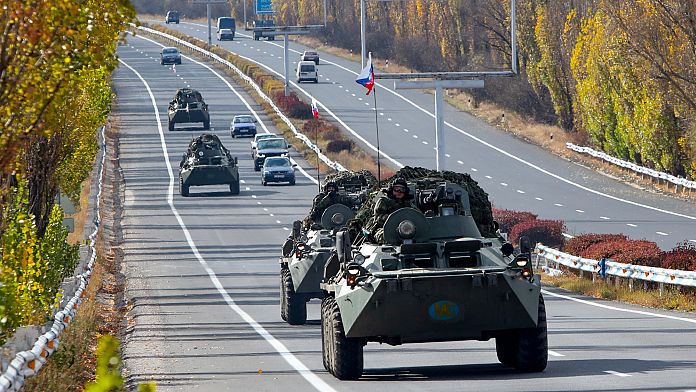
Erevanul a negat afirmațiile inițiale, dar Kievul a publicat ceea ce pretinde a fi un ordin al armatei ruse de a-și spori prezența militară la cea mai mare bază a Rusiei din Armenia, lângă granița cu Turcia.
Sursa: EuroNews
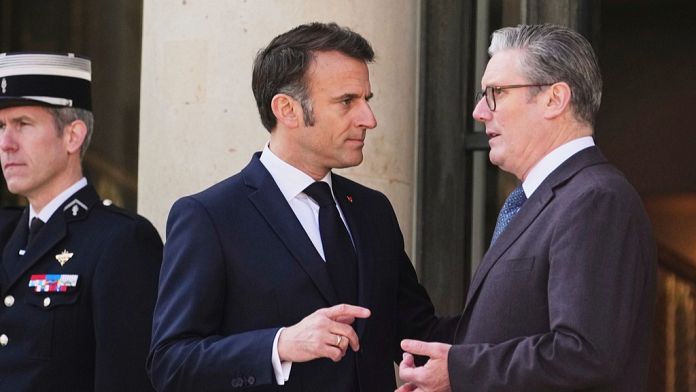
Liderul francez urmează să sosească în Marea Britanie marți pentru o vizită de stat de trei zile, care va combina discuții politice și ceremonii regale.
Sursa: EuroNews

Un nou raport dezvăluie că siturile din Patrimoniul Mondial UNESCO, inclusiv Taj Mahal și Acropole, sunt din ce în ce mai amenințate de pericolele grave legate de apă.
Sursa: EuroNews
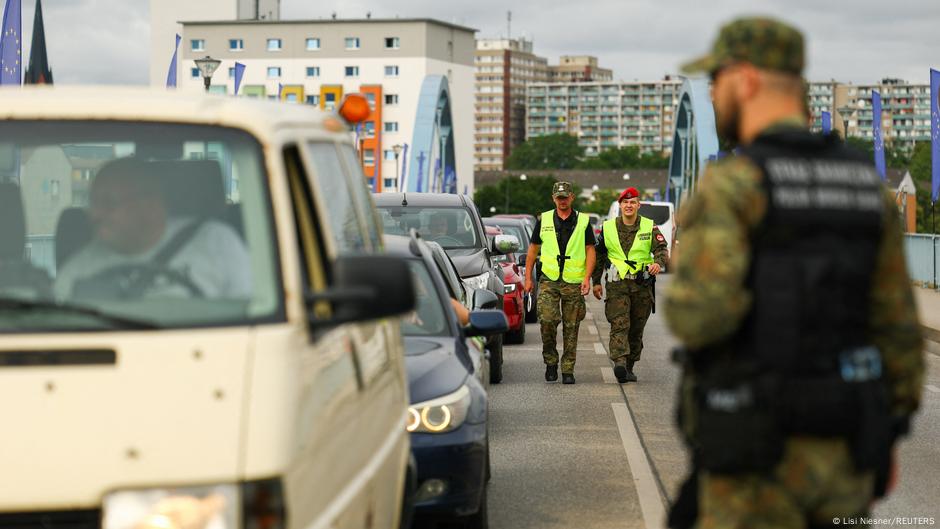
According to Polish Prime Minister Donald Tusk, the controls are temporary and aimed at stopping human trafficking and irregular migration. Yet the move comes just weeks after Germany itself ramped up checks along all its land borders, including with Poland, under the new conservative government of Chancellor Friedrich Merz. For many observers here in Brussels, the tit-for-tat measures reflect a deeper shift away from European solidarity and toward national self-interest.
Created in the 1990s, the Schengen Area allows passport-free travel across 29 European countries, covering most of the EU plus several non-members like Norway and Switzerland. It facilitates the free movement of over 450 million people and underpins Europe’s single market by eliminating internal border checks for goods, services, and labor. For businesses, commuters, and travelers alike, Schengen is one of the EU’s most practical achievements.
In an interview with DW, Birte Nienaber, Associate Professor at the University of Luxembourg, underlined that Europe is seeing a slow erosion of border-free moment in Europe, one frontier at a time.
Germany started controlling all of its land bordersImage: Monika Stefanek/DW
Davide Colombi, a migration researcher at the Centre for European Policy Studies (CEPS) based in Brussels, agrees that the recent Polish-German dispute fits a broader European pattern.
France has maintained border checks since the 2015 terrorist attacks. Austria first introduced controls on its borders with Slovenia and Hungary in September 2015, at the height of the refugee crisis, and has renewed them every six months since, citing migration pressures and internal security.
Slovenia introduced checks with Croatia less than a year after the latter joined Schengen, citing increased migration and concerns over organized crime. And Germany, which had long resisted tightening its internal borders, began expanding them last autumn, a move the European Commission has so far not formally challenged. Under EU law, such checks are only allowed in exceptional circumstances and must be temporary.
“These border controls are purely political symbolism, without a real effect of curbing migration,” says Professor Nienaber. She emphasizes that with the rise of far-right forces in Europe, populist narratives are gaining grounds across all parties. Centrist leaders face pressure to show “toughness” on migration — and border controls are a visible measure popular with the public.
But how effective are they really? Official statistics cast doubt on the pertinence of border checks inside the Schengen area. German police say that in the first month of enhanced border operations this spring, just 160 asylum seekers were turned away. Polish media reports that Germany returned around 1,000 migrants to Poland between May and mid-June, a figure not significantly different from previous years.
“Smugglers or those trying to enter irregularly know exactly how to avoid official checkpoints,” said migration expert Nienaber. “The controls don’t stop them. They only create the illusion of control.”
Researcher Colombi agreed that such policies are more about optics than outcomes. He underlined that EU member states have so far failed to prove the necessity for the controls in, for instance, curbing migration, or preventing terrorist attacks.
Poland has now also started controlling its border with GermanyImage: DW
Meanwhile, border communities, especially in regions like Luxembourg, Austria, and Poland, are already feeling the negative effects: longer wait times, disrupted supply chains, and growing economic stress on cross-border local businesses. A detailed European Parliament study estimated that reinstating internal border checks leads to substantial time losses: 10–20 minutes for cars and 30–60 minutes for heavy vehicles, and costs the transport sector around €320 million — and that’s only accounting for delays, not the broader economic fallout.
The economic cost is therefore not trivial. Schengen affects the free movement of goods, services, capital and people: the four pillars of the EU single market. Prices could rise, supply chains could slow, and cross-border jobs and businesses could be lost.
A Bulgarian logistics association recently estimated border delays previously cost the sector €300 million (hitting not just supply chains, but also the livelihoods of thousands who depend on seamless daily crossings.
EU law allows internal border checks in exceptional cases: they must be limited to six months with clearly justified renewals. Yet several member states have simply continued extending them. France’s controls have been in place almost continuously for nearly a decade. Austria, Denmark, Sweden and now Germany have also operated under long-term exceptions.
“We can see that these border checks are becoming permanent in some member states. That was never the intent of the Schengen agreement,” says researcher Colombi.
He explains that the European Commission has faced criticism for not enforcing limits more robustly, for instance through infringement procedures. This could risks opening the floodgates for others, creating a domino effect.
Citește mai multe știri pe top10stiri.ro
The Schengen agreement turned 40 years in 2025Image: Harald Tittel/dpa/picture alliance
The EU and its leaders are aware of the risks. If internal border checks become permanent, the Schengen system could unravel entirely.
This would not only disrupt the free movement of people, goods, services, and capital, key pillars of the EU single market, but also undermine the legal integrity of EU treaties, increase costs for businesses, slow supply chains, potentially erode citizens’ trust in the European project itself.
The Commission is now working to update the Schengen Borders Code and launch two digital border management tools: the Entry/Exit System (ESS) and the ETIAS, a visa-waiver screening platform. Both are designed to better track non-EU nationals entering the zone and reduce the perceived need for internal checks.
The Commission says these reforms represent an evolution of Schengen, not its breakdown. But Colombi argues that if Schengen is to survive, it will need more than legal tweaks or digital tools.
Rather, he says, “we need political courage, the rebuilding of mutual trust between member states and enforcement by the European Commission.” Above all, the subject of migration should be de-politicized, shifting the public debate away from ineffective measures such as border controls.
Both experts are skeptical that this will happen anytime soon. With far-right parties reshaping political narratives in many countries, the pressure to reassert national sovereignty is only growing, Nienaber explains. She warns that if governments continue to use internal border controls as political instruments, rather than last resort security tools, the Schengen Area could soon fall to pieces.
Should Schengen fall apart, the economic damage could be severe. Reinstated border checks would slow down the flow of goods, disrupt just-in-time supply chains, and increase transport costs, particularly in logistics-heavy sectors like agriculture, retail, and manufacturing. Cross-border workers would face longer commutes, while small businesses in border regions could lose vital customers. For everyday citizens, it could mean longer queues at borders, higher prices in stores, and diminished access to services and job markets across borders.
But the symbolic loss could be just as profound, says Colombi: “Schengen is one of the most visible signs of a common European identity and a flag-ship achievement.” Should Schengen fall, it’s most tangible way to experience the EU as a transnational project for citizens would fall, too.
To prevent that, both experts argue that the EU and its member states must recommit to the core idea behind Schengen: that Europeans should be able to move freely, without fear, delay, or political posturing, across their shared continent.
Edited by: M. Cavanagh
Tessa Walther Brussels-based Europe correspondentSend us your feedback
Sursa: DW
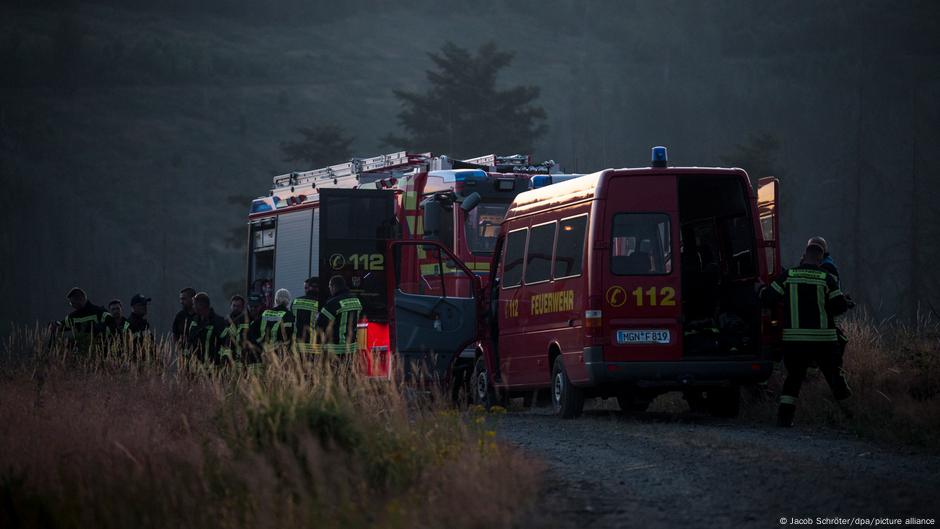
The checks come in response to stricter German controls at the shared border, which have been stepped up under Chancellor Friedrich Merz’s government after they were reintroduced in November 2023.
Meanwhile, raging wildfires in forested areas in Germany’s eastern states are reportedly under control after firefighters spent a tense weekend battling the blazes.
The state of Thuringia was particularly badly hit by what was described as its biggest wildfire in over three decades.
This blog has now closed. Find out what Germany was talking about on Monday, July 7, in our daily updates with a mix of news, analysis and background.
Skip next section Germany records more than 2,000 drug-related deaths in 202407/07/2025July 7, 2025
Zac Crellin
Experts have sounded the alarm after Germany recorded upwards of 2,000 deaths from illegal drug use for the second consecutive year.
A total of 2,137 drug deaths were recorded in 2024, federal drug commissioner Hendrik Streeck said on Monday.
Although the total is slightly down from 2,227 deaths recorded in 2023, authorities nevertheless recorded 14% year-on-year increase in drug-related deaths in under-30s.
Streeck said there was a sharp increase in deaths due to synthetic opioids like fentanyl or nitazene because of the Taliban’s ban on opium production in Afghanistan.
“We must react faster, more systematically and stronger to new, more dangerous drugs,” Streeck said.
Dirk Schäffer, drug policy officer at campaign group Deutsche Aidshilfe, said the increase in drug-related deaths was a “catastrophe.”
“We’ve seen a doubling in the last 10 or 12 years,” he told Germany’s DPA news agency.
To view this video please enable JavaScript, and consider upgrading to a web browser that supports HTML5 video
https://p.dw.com/p/4x5wRSkip next section German industrial output jumps, raising hopes of recovery07/07/2025July 7, 2025
The auto industry is at the core of Germany’s economic output Image: Martin Meissner/AP/picture alliance
German industrial production rose unexpectedly strong in May, lifting hopes that Europe’s largest economy may be turning a corner despite trade tensions with the US.
Production climbed 1.2% month-on-month after falling 1.6% in April, when US President Donald Trump announced sweeping tariffs, the federal statistics office Destatis said Monday.
Analysts polled by FactSet had expected a slight drop of 0.1%.
The rebound was driven by a surge in energy output and a 4.9% boost in the struggling automotive sector.
Overall, production was up 1% compared with May last year, adding to optimism after several positive production and orders reports since January.
ING analyst Carsten Brzeski said the data increased the chance that the recovery is about more than just customers placing orders early to avoid tariffs.
“It’s too early to give the all-clear, but signs of at least a cyclical rebound, albeit from low levels, are increasing”, he said.
https://p.dw.com/p/4x4a1Skip next section WATCH: Old German drivers — a risk on the streets?07/07/2025July 7, 2025
To view this video please enable JavaScript, and consider upgrading to a web browser that supports HTML5 video
https://p.dw.com/p/4x4a0Skip next section WATCH: Experiencing Germany by train — Euromaxx07/07/2025July 7, 2025
To view this video please enable JavaScript, and consider upgrading to a web browser that supports HTML5 video
https://p.dw.com/p/4x4ZzSkip next section German welfare organizations warn against proposed cuts to long-term care services07/07/2025July 7, 2025
A commission led by German Health Minister Nina Warken will begin work on Monday to find ways of stabilizing the long-term care insurance system in Germany as demographic changes put increasing pressure on its institutions.
According to federal auditors, nursing care insurance providers could face a shortfall of €12.3 billion (which those in need of care temporarily carry the costs themselves.
The commission, composed of representatives from the federal government and Germany’s 16 states, is to present its findings by the end of the year.
https://p.dw.com/p/4x40fSkip next section WTO: EU, Germany push for new world trade body 07/07/2025July 7, 2025
Thomas KohlmannThe World Trade Organization has been hamstrung for years by outdated rules and stalled reform efforts due to internal disagreementsImage: AP
Brussels and Berlin have launched a new initiative aimed at bypassing the long-standing paralysis of the World Trade Organization (WTO).
But how viable is such a solution?
DW looks into it here.
https://p.dw.com/p/4x4ZySkip next section German president remembers Nazi victims at Lithuania ceremony07/07/2025July 7, 2025
Richard Connor
German President Frank-Walter Steinmeier has commemorated the Lithuanian victims of the Nazis during World War II in a ceremony near the Baltic country’s capital Vilnius.
Steinmeier laid a wreath at the Paneriai Holocaust memorial. The event was also attended by Lithuanian Prime Minister Gintautas Paluckas.
Some 120,000 people were murdered by Nazis and local collaborators in the Paneriai forest during the German occupation of Lithuania between July 1941 and July 1944. At least 70,000 Jews were among them.
https://p.dw.com/p/4x4OuSkip next section Riders crash into crowd at major cycling race, injuring several — reports07/07/2025July 7, 2025
Two spectators at the German Track Cycling Championships in the western municipality of Dudenhofen were flown to hospital by helicopter on Sunday after two riders crashed into the crowd at high speed, German media have reported.
Eight other spectators were more lightly injured, and the two riders, who were traveling at about 60 kmh (37 mph) when they went over the safety barriers, escaped with just grazes and bruises, according to the reports.
The incident, which occurred during the elite keirin semi-finals, led to the remainder of the final day of competition being called off, Germany’s SWR broadcaster reported.
“The health of athletes and spectators always comes first,” German Cycling Federation (BDR) marketing and communications officer Oliver Streich said in a statement. “There was therefore no alternative to canceling the event.”
https://p.dw.com/p/4x3dDSkip next section Space capsule with ashes of 166 deceased plunges into Pacific07/07/2025July 7, 2025
A space capsule launched by a German start-up that was meant to carry the ashes of 166 people twice around the Earth before returning them to their loved ones has been lost in the Pacific Ocean after “an anomaly occurred” upon re-entry into the Earth’s atmosphere.
Citește mai multe știri pe top10stiri.ro
The Nyx capsule was launched on June 23 as part of an initiative called “Mission Possible” by The Exploration Company (TEC) in collaboration with the Texas-based company Celestis, which has specialized in space burials for more than two decades.
TEC said communication had been lost with the capsule shortly before it was due to splash down, with all remains of the deceased and some experimental items, including cannabis seeds, now scattered at an unknown location in the Pacific.
https://p.dw.com/p/4x3h7Skip next section DW’s Global Media Forum gets underway07/07/2025July 7, 2025
DW’s annual Global Media Forum (GMF), to which Germany’s international broadcaster has invited media professionals from across the globe, kicks off on Monday in the western city of Bonn.
The event, which runs for two days, has the motto this year of “Breaking barriers, building bridges.”
This year’s Freedom of Speech Award, a prize given annually by DW for outstanding work in promoting freedom of expression and human rights, will go to Tamar Kintsurashvili from Georgia.
Details on the GMF can be found in this article:
Global Media Forum 2025: Building bridges to beat populism
https://p.dw.com/p/4x3RsSkip next section Poland restores spot checks at German border in tit-for-tat move07/07/2025July 7, 2025
Polish guards check vehicles at the Slubice border crossing Image: Lisi Niesner/REUTERS
Authorities in Poland on Monday began carrying out random checks at 52 border crossings at the country’s border with Germany in a move contrary to the spirit of the visa-free Schengen zone.
The move comes in response to stricter German controls at the shared border, which have been stepped up under Chancellor Friedrich Merz’s government after they were reintroduced in November 2023.
The Polish border checks, which also apply to Poland’s border with Lithuania, are set to run initially until August 5.
Interior Minister Tomasz Siemoniak said Sunday the controls were meant only to combat “illegal immigration” and that Polish and other EU nationals would not face hindrances.
The controls will reportedly focus on buses, minibuses, cars carrying large numbers of passengers and vehicles with tinted windows.
EU rules on the Schengen area stipulate that countries are allowed to introduce temporary measures as a “last resort” and “in exceptional situations.”
Read the full story here
https://p.dw.com/p/4x3RrSkip next section Wildfire situation stabilizes in Germany’s east07/07/2025July 7, 2025
Firefighting aircraft were deployed to battle the blazes in ThuringiaImage: Daniel Vogl/dpa/picture alliance
Several wildfires in forested areas in Germany’s eastern states are reportedly under control after firefighters spent a tense weekend battling the blazes.
The state of Thuringia was particularly badly affected, with a fire in the Saalfeld-Rudolstadt district described as the state’s biggest wildfire in more than three decades.
“Our forces are exhausted,” said district administrator Marko Wolfram on Sunday, adding that he hoped emergency staff could be reduced from 500 on Sunday to 300 on Monday as the situation eased.
Hundreds of firefighters were also deployed between the states of Saxony and Brandenburg, where raging fires in the Gohrischheide region have burnt out large swathes of natural landscape.
The wildfires broke out as Germany, along with much of western Europe, was hit by the first major heat wave of the summer.
https://p.dw.com/p/4x3SsSkip next section Welcome to our coverage07/07/2025July 7, 2025
Timothy Jones | Elizabeth Schumacher Editor
A big Guten Morgen from the newsroom in Bonn as we start a new week.
Firefighters in the east of Germany, who have been battling major blazes all weekend, are feeling more optimistic as the weather cools following last week’s heat wave.
And DW is hosting the Global Media Forum in Bonn, an event bringing together journalists from across the world at a time when press freedom is under growing pressure even in countries once known as bastions of media liberty.
We will be keeping you up to date on these and other developments in our blog, as well as presenting in-depth analyses and explainers on topics related to Germany from our colleagues across DW’s departments.
https://p.dw.com/p/4x3X6Timothy Jones Writer, translator and editor with DW’s online news team.Richard Connor Reporting on stories from around the world, with a particular focus on Europe — especially Germany.Send us your feedback
Sursa: DW
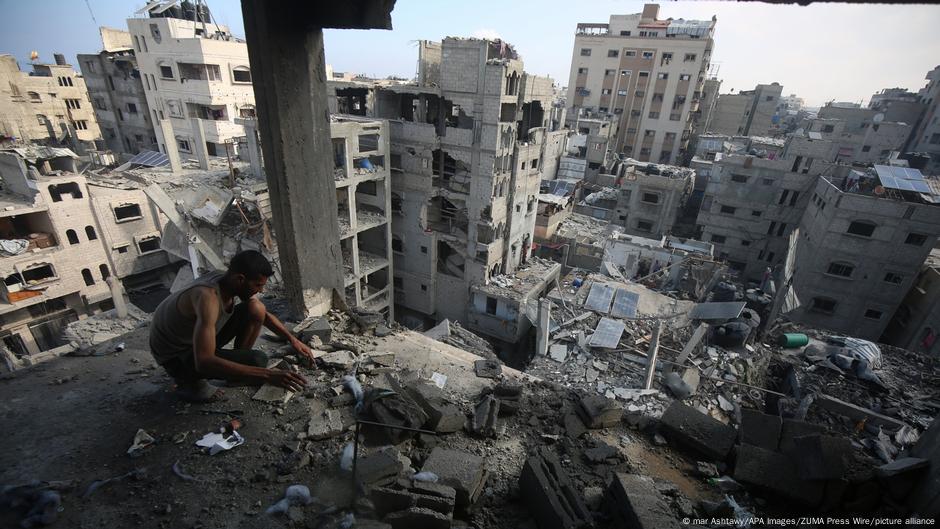
This blog has now closed. Here you can read the headlines from around Gaza, Israel and the wider Middle East on Monday, July 7.
Skip next section Trump, Netanyahu to discuss Gaza ceasefire deal07/07/2025July 7, 2025
Trump and Netanyahu have met three times since JanuaryImage: Saul Loeb/AFP/Getty Images
The White House said a proposed ceasefire deal between Israel and Hamas would be on the agenda when Israeli Prime Minister Benjamin Netanyahu meets with US President Donald Trump.
White House press secretary Karoline Leavitt says Trump’s special envoy for the Middle East, Steve Witkoff, will head to Qatar later this week where indirect negotiations are taking place.
“The utmost priority for the president right now in the Middle East is to end the war in Gaza and to return all of the hostages,” Leavitt said.
On Sunday, Trump said “we are working to achieve the much discussed deal.”
The meeting will be the third time Trump hosts Netanyahu since the US president returned to office in January
To view this video please enable JavaScript, and consider upgrading to a web browser that supports HTML5 video
https://p.dw.com/p/4x68MSkip next section Houthis claim ‘Magic Seas’ cargo ship sinks in Red Sea after attack07/07/2025July 7, 2025
The Magic Seas was passing near Yemen when it was attacked by the Houthis [FILE: August 9, 2022]Image: Nektarios Papadakis/AP/picture alliance
The Iran-backed Houthi rebels in Yemen said Monday evening that a cargo ship, the Magic Seas, had sunk after they attacked it in the Red Sea on Sunday.
The Houthis attacked the Liberian-flagged, Greek-owned bulk carrier with drones, missiles, rocket-propelled grenades and small arms fire.
United Kingdom Maritime Trade Operations center (UKMTO) said that an armed security team on the vessel had returned fire against an initial attack with guns. Private maritime security firm Ambrey said the ship had also been attacked by drone boats that carried bombs.
The crew of 22 was forced to abandon ship and was reportedly rescued by a passing merchant vessel.
Claims that the ship sunk could not be immediately verified.
The Houthis’ military spokesperson, Brig. Gen. Yahya Saree, said the group would continue targeting ships in the Red Sea “until the aggression on Gaza stops and the siege on it is lifted.”
The Red Sea is one of the world’s busiest shipping routes, connecting Europe and Asia via the Suez Canal in Egypt.
Houthi attacks from late 2023 to late 2024 caused significant disruption to navigation in the area.
https://p.dw.com/p/4x5gySkip next section US moves to lift Hayat Tahrir al-Sham (HTS) terror designation07/07/2025July 7, 2025
The Trump administration has moved to lift the terror designation for Islamist group Hayat Tahrir al-Sham (HTS) in Syria, according to an unpublished memo seen by news agencies on Monday.
HTS had been designated as a “foreign terrorist organization” by the United States.
It was originally the Syrian branch of al-Qaeda, and was known as the Nusra Front before it changed its name and cut ties with al-Qaeda.
HTS spearheaded the 2024 offensive that overthrew the regime of former Syrian leader Bashar Assad and is now overseeing a transition period.
The US notice is set to be published on Tuesday, July 8. The memo said the revocation “goes into effect upon publication.”
To view this video please enable JavaScript, and consider upgrading to a web browser that supports HTML5 video
https://p.dw.com/p/4x5XySkip next section Israel claims arrest of Iran Quds Force members in Syria07/07/2025July 7, 2025
Israel on Monday said its military had arrested members of Iran’s paramilitary Quds Force operating in Syria.
The Quds Force belongs to the Islamic Revolutionary Guard and is Iran’s de facto fighting force.
The Israel Defense Forces (IDF) said it arrested members of the outfit in southern Syria. Israel offered no further information on the arrests.
Monday’s announcement followed the Israeli arrest last week of three Palestinians in Syria for their membership in a “terror cell controlled by Iran.”
“For the second time in the past week … troops completed a targeted overnight operation and apprehended several operatives who posed a threat in the area,” said the IDF’s Monday statement.
In mid-June, Israel claimed that it had arrested several members of the Palestinian Islamist militia Hamas in Syria.
https://p.dw.com/p/4x4w4Skip next section US envoy encouraged by Lebanon’s take on Hezbollah disarmament07/07/2025July 7, 2025
US Special Envoy Thomas Barrack on Monday said he was “unbelievably satisfied” with Lebanon’s response to a US plan for disarming the Iran-backed Lebanese militia Hezbollah.
The militant Islamist group recently vowed that it would not give up its weapons, yet Beirut gave a detailed seven-page report to the US in response to Washington’s June 19 proposal for disarming the group.
After meeting with Lebanon’s President Joseph Aoun, Barrack told reporters: “What the government gave us was something spectacular in a very short period of time. I’m unbelievably satisfied with the response.”
In a warning to the impoverished Middle Eastern country, Barrack had previously said Lebanon risks being “left behind” by developments in the region.
US Envoy Barrack also called for Hezbollah to become a purely political player in the region, saying the group “needs to see that there is a future” for it in the Middle East.
Hezbollah joined attacks on Israel shortly after Hamas launched its October 7, 2023, attack on Israeli civilians, with Israel regularly returning fire into Lebanon.
https://p.dw.com/p/4x4QxSkip next section Israel launches fresh strikes on Houthis07/07/2025July 7, 2025
Jon Shelton
Israel on Monday launched attacks at Houthi targets in Yemen hours after a Greek-owned, Liberian-flagged cargo ship — the Magic Seas — was attacked near the Yemeni port of Hodeidah late Sunday.
Israeli air forces on Monday struck targets in ports of Hodeidah, Ras Isa and Salif, as well as a power plant at Ras Qantib.
“These ports are used by the Houthi terrorist regime to transfer weapons from the Iranian regime, which are employed to carry out terrorist operations against the state of Israel and its allies,” read an Israeli military statement.
Israel also struck the Galaxy Leader, a vessel seized by the Houthis last November. The group had been using it to track international maritime traffic and plan further attacks.
Yemen’s Houthi rebels, who are thought to be behind the attack on the Magic Seas, fired two missiles at Israel in response to the strikes. Israeli military efforts to intercept the missiles appear to have failed, though no injuries have been reported.
The attack on the Magic Seas was reportedly carried out with bomb-laden drone boats, signaling a potential escalation of Iranian involvement. The Islamic Republic is a backer of the rebel Houthis, who began attacking Israel in response to its military campaign against Hamas in retribution for Hamas’ October 7, 2023, attacks on Israel.
Both the US and Israel have attacked Houthi strongholds in an effort to ensure freedom of movement for nearly
As Gaza ceasefire talks loom and the world waits to see how Iran will react to the recent US bombing of its nuclear program, Israel issued a warning to both the Houthis and leaders in Tehran.
“What’s true for Iran is true for Yemen,” said Defense Minister Israel Katz: “Anyone who raises a hand against Israel will have it cut off. The Houthis will continue to pay a heavy price for their actions.”
https://p.dw.com/p/4x4AGSkip next section Israel to issue conscription notice to 54,000 ultra-Orthodox Jewish men07/07/2025July 7, 2025
The Israeli army on Sunday said it will begin sending conscription notices to 54,000 ultra-Orthodox Jewish men through July, who were exempt from military service until now.
“The army will begin this week issuing summons to complete the enlistment process for ultra-Orthodox men whose status as yeshiva (religious seminary) students is no longer valid following the expiration of the previous legal arrangement,” said a military statement.
“The military will continue efforts to expand enlistment among the ultra-Orthodox public, while working to ensure the best possible conditions that respect their unique way of life,” it added.
This move is highly controversial and could spell trouble for Netanyahu’s coalition government, which includes representatives from the ultra-Orthodox community as well.
An arrangement dating back to 1948 exempts the ultra-Orthodox, or Haredi (God-fearing) Jews who are dedicated to religious studies, from military service.
Around 66,000 men currently fall under the exemption.
Israel’s Supreme Court has often challenged this status since the 2000s. Since June 2024, the ruling government has been under pressure from the judicial system to start drafting Haredi men.
To view this video please enable JavaScript, and consider upgrading to a web browser that supports HTML5 video
https://p.dw.com/p/4x3g9Skip next section Netanyahu to meet Trump at White House07/07/2025July 7, 2025
Israeli Prime Minister Benjamin Netanyahu left on Monday to meet with US President Donald Trump at the White House in Washington DC.
“This is my third visit with (US President Donald Trump) since he was elected over six months ago,” Netanyahu told reporters at Ben Gurion Airport near Tel Aviv before his departure.
Netanyahu also plans to meet US government officials as well as other Republican and Democratic leaders.
To view this video please enable JavaScript, and consider upgrading to a web browser that supports HTML5 video
On Sunday, Trump had said that a ceasefire and hostage release deal could possibly be reached this week.
“We are working to achieve the much discussed deal, on the conditions that we have agreed to,” Netanyahu said, referring to a US proposal. Hamas has requested some amendments but agreed to the proposal in principle.
Experts and analysts believe that Israel and Hamas will be able to overcome their differences to reach a deal.
To view this video please enable JavaScript, and consider upgrading to a web browser that supports HTML5 video
https://p.dw.com/p/4x3foSkip next section BRICS leaders express ‘grave concern’ about Gaza situation07/07/2025July 7, 2025
Leaders of the BRICS group of nations expressed “grave concern” about the situation in Gaza after their meeting on Monday.
“We reiterate our grave concern about the situation in the Occupied Palestinian Territory, with the resumption of continuous Israeli attacks against Gaza and obstruction of the entry of humanitarian aid into the territory,” they said.
The group called for adherence to international law while also encouraging an immediate ceasefire, withdrawal of Israeli troops from Gaza and the release of all detainees and hostages.
They also condemned the Israeli and US military strikes on Iran.
https://p.dw.com/p/4x3QcSkip next section First round of Israel-Hamas ceasefire talks ends indecisively: sources07/07/2025July 7, 2025
The first round of ceasefire talks between Israel and Hamas in Doha, Qatar, ended inconclusively, Palestinian sources close to the matter said on Monday.
“After the first session of indirect negotiations in Doha, the Israeli delegation is not sufficiently authorized … to reach an agreement with Hamas, as it has no real powers,” the sources told Reuters news agency.
The BBC reported that the talks took place in two different buildings, and lasted for about three and a half hours.
The two sides communicated through Qatari and Egyptian mediators, but to no avail. Talks are expected to resume again on Monday.
https://p.dw.com/p/4x3NPSkip next section Welcome to our coverage07/07/2025July 7, 2025
Tanika Godbole with AP, AFP, dpa, Reuters | Elizabeth Schumacher Editor
Hello and welcome to DW’s coverage of developments in the Middle East on Monday, July 7, 2025.
Talks between Israel and Hamas in Doha, Qatar, on Sunday about a possible ceasefire ended inconclusively, Palestinian sources close to the matter said.
Israeli Prime Minister Benjamin Netanyahu is flying to Washington for talks with US President Donald Trump, who suggested on Friday that there “could be a Gaza deal” next week.
https://p.dw.com/p/4x3M2Tanika Godbole Multimedia Journalist based in New DelhiJon Shelton Writer, translator and editor with DW’s online news team.Send us your feedback
Sursa: DW
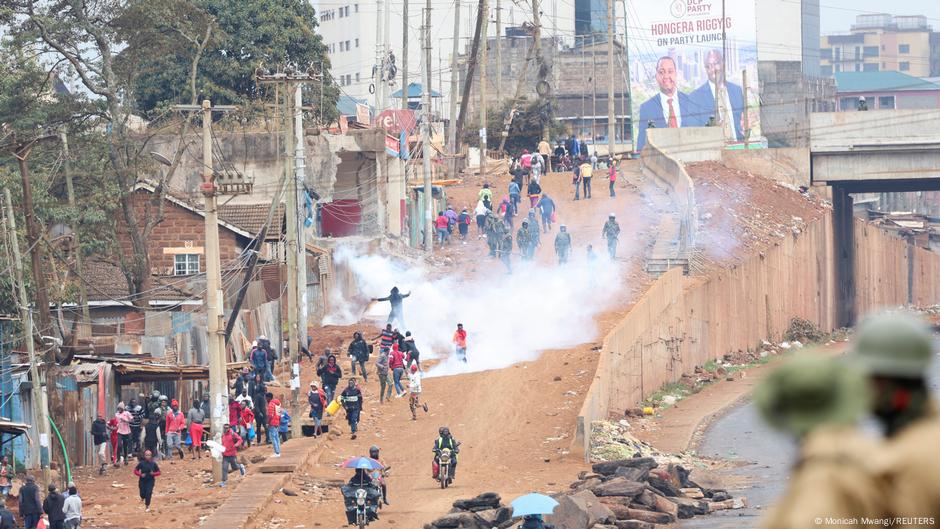
Poliția a închis în această dimineață drumurile care duc spre capitala Nairobi pentru a împiedica protestatarii să se adune în centrul orașului, a raportat Felix Maringa, corespondentul DW la Nairobi.
Un comunicat al poliției emis luni seară a precizat că peste 560 de persoane au fost arestate în toată țara în timpul protestului de luni. Declarația, care a fost publicată după raportul KNCHR, a estimat că 11 persoane au fost ucise și că zeci de ofițeri de poliție au fost răniți.
Protestatorii au comemorat luni demonstrațiile din 7 iulie, cunoscute sub numele de „Saba Saba”, swahili pentru șapte șapte, primele proteste majore din Kenya care au avut loc acum 35 de ani.
Urmărește cele mai importante știri
Aceste proteste au cerut o tranziție de la un stat cu un singur partid la o democrație multipartidă, primele alegeri multipartide având loc în 1992.
Astăzi, protestatarii cer demisia președintelui William Ruto din cauza presupusei sale corupții. Alte probleme invocate de protestatari includ costul ridicat al vieții, brutalitatea poliției și proasta guvernare.
Sursa: DW